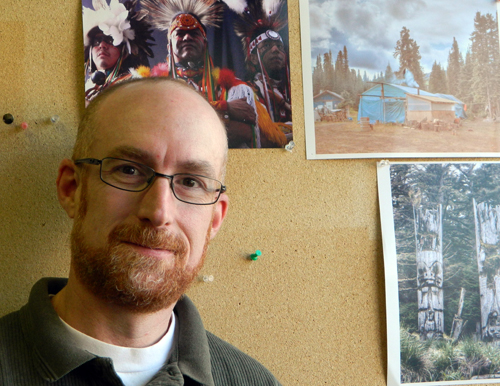
In the northern B.C. community of Iskut, hunting and fishing are popular topics of conversation among the 350 or so native people who live there. These two endeavours provide a significant food source for the community and are also part of their traditional way of life.
U of G anthropology professor Thomas (Tad) McIlwraith spent many months listening and recording those discussions. “A lot of it was just hanging out and observing,” he says. “I would leave a tape recorder running in the hunting camp.”
What surprised McIlwraith, though, was that when the hunters spoke of “the one that got away” (as they often did, McIlwraith says), it was “not a story of failure.” He explains: “They validated the power and agency of the animal – a moose, for example – to control the outcome of the hunt. They saw the moose as a sentient being, and if he felt he was not being treated with respect, he would not offer up his life.”
These beliefs suggest that the animals are not passive: they have the power to decide if you should live by eating them or perhaps die of starvation. “The spirit of the moose interacts with the spirit of the person. If you die,” McIlwraith says, “that may be because you have been disrespectful.”
In these conversations, the hunters were discussing myths from the past, but in new forms. These beliefs are infused in current hunting practices among the Iskut community.
Northern B.C. is a long way from McIlwraith’s childhood home in Mississauga, Ont. He did his undergraduate work at the University of Toronto, majoring in English literature and Canadian history. But after attending a potlatch in Bella Coola, B.C., he realized that the field of anthropology held greater attractions for him, so he did a make-up year in anthropology and then started his master’s at the University of British Columbia.
With a friend, McIlwraith started a research consulting company for aboriginal communities, helping them identify traditional land-use data and the locations of historical, cultural and sacred places. He eventually decided to return to school and earn his PhD with the goal of investigating different ways to help the native peoples document their practices. McIlwraith opted to study at the University of New Mexico to work with professors who had expertise in this area.
His PhD studies were carried out among the hunters of Iskut, seeking to understand how they used the land in the context of mining and logging industries that also wanted to use the land. Even before he graduated, McIlwraith was teaching anthropology at Douglas College in B.C. and by 2006 was working there full-time. He continued to work as a consulting anthropologist with First Nations communities as well.
His ongoing research has taken him to a new location, the Shuswap and North Okanagan regions of B.C., where he works with the Secwepemc people. “My work there is still about land use,” he says. “This area, unlike the northern part of B.C., is largely farmland and private property. This creates many barriers to the Secwepemc, who want to access traditional hunting and fishing areas.”
He has also spent time working with a Sekani family to write a biography of an aboriginal hunter who was born in 1922 and whose father was born in 1864, providing almost 150 years of stories about their lives. Previously, he helped a woman write and publish a small illustrated book on the techniques she used to clean and tan hides, called My Story of Making and Sewing Hides by Penny Louie. “She’s so proud of that book,” he says.
Coming back to Guelph brings McIlwraith closer to his extended family again, but he expects to continue to travel to B.C. frequently to carry out his research. While he’s enthusiastic about cooking food on a barbecue and down-hill skiing, he says his work is his passion. “I love being part of these communities and learning from people living in ways different from the way I was raised.
“First Nations people and their cultures are very vital and vibrant; they are not stuck in the past,” he adds. “They draw on their past traditions, as we all do, but they are also living in the contemporary world. There’s also a stereotype that they all agree – all of them are trying to prevent development, for example. It’s not true. Even in a community of just 350 people, there were many different opinions, and people want that multiplicity of voices to be heard.”